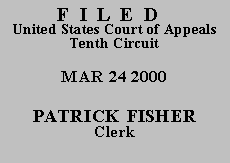

| UNITED STATES OF AMERICA,
Plaintiff-Appellee,
v.
GEORGE W. TURLEY Defendant-Appellant. |
No. 99-3027
(D.C. No. 97-CV-3204) (Kansas) |
George Turley, a pro se federal prisoner, brought this proceeding under 28 U.S.C. § 2255 asserting three grounds for relief: (1) the sentencing guidelines are unconstitutional, (2) his trial attorney was ineffective in failing to object to a sentence enhancement for obstruction of justice, and (3) the enhancement was not supported by clear and convincing evidence or by proper fact findings. While the motion was pending in district court, Mr. Turley filed two supplemental pleadings asserting additional grounds for relief.
The district court ruled that the first and third claims in the initial motion were procedurally barred by Mr. Turley's failure to raise them on direct appeal. See United States v. Turley, 37 F. Supp. 2d 1262, 1264 (D. Kan. 1998). The court addressed the ineffective assistance claim on the merits and denied it. See id. at 1265. Finally, the court construed the two supplemental pleadings as unauthorized successive motions under section 2255 and transferred them to this court under Coleman v. United States, 106 F.3d 339, 341 (10th Cir. 1997). See Turley, 37 F. Supp. at 1265-66. This court notified Mr. Turley that he had thirty days in which to file a proper motion for permission to bring successive section 2255 motions and that his failure to do so would result in the denial of authorization. When Mr. Turley did not respond, the matter was dismissed. Turley v. United States, No. 99-3002 (10th Cir. Apr. 6, 1999).
Mr. Turley now appeals, raising four arguments. He first contends the district court erred by failing to follow USSG § 5G1.3 and in failing to credit him with time previously served on related counts. He further contends the government erred in grouping his counts. These claims were first raised in Mr. Turley's supplemental pleadings and were dismissed as unauthorized by this court. Accordingly, we do not consider them.(1)
Mr. Turley argues that his sentence violated due process because the enhancement for perjury was not supported by clear and convincing evidence. The district court held this claim procedurally barred by Mr. Turley's failure to raise it in his direct appeal. See Turley, 37 F. Supp. at 1264. "A defendant who fails to present an issue on direct appeal is barred from raising the issue in a § 2255 motion, unless he can show cause for his procedural default and actual prejudice resulting from the alleged errors, or can show that a fundamental miscarriage of justice will occur if his claim is not addressed." See United States v. Allen, 16 F.3d 377, 378 (10th Cir. 1994). Mr. Turley does not argue on appeal that the district court erred in applying procedural bar to this claim and we therefore do not consider it.(2)
Mr. Turley also contends the district erred in applying this enhancement because the court's findings were not adequate and the evidence was insufficient. Mr. Turley did not raise these issues either at sentencing or in his direct appeal. In his initial section 2255 motion, Mr. Turley raised them only by asserting that his counsel was ineffective at sentencing in failing to do so. The district court addressed the ineffectiveness argument on the merits and rejected it, ruling counsel had not been ineffective because the presentence report, which the sentencing court had adopted, detailed the evidence of Mr. Turley's false trial testimony and was sufficient to support the enhancement. Mr. Turley does not assert in this appeal that his trial counsel was ineffective. Because the challenges Mr. Turley makes to the enhancement itself are otherwise barred by his failure to raise them on direct appeal, and he has not offered us any argument against the application of the bar, we do not address these claims on the merits.
In sum, we conclude that none of Mr. Turley's claims are before us on the merits. We deny his motion for a certificate of appealability and dismiss his appeal.
ENTERED FOR THE COURT
Stephanie K. Seymour
Chief Judge
*.This order and judgment is not binding precedent, except under the doctrines of law of the case, res judicata, or collateral estoppel. The court generally disfavors the citation of orders and judgments; nevertheless, an order and judgment may be cited under the terms and conditions of 10th Cir. R. 36.3.
1. In his motion for certificate of appealability filed with this court, Mr. Turley argues that the district court improperly construed his attempts to amend his initial motion as successive section 2255 petitions. These arguments come too late. Mr. Turley was given notice that this court was treating his supplements as successive motions and had an opportunity to respond and make these arguments at that time. When he failed to do so the matters were dismissed. They are therefore no longer before us.
2. We note, as did the district court, that this claim would fail on the merits in any event because this enhancement need be proven only by a preponderance of the evidence. See United States v. Pelliere, 57 F.3d 936, 938 (10th Cir. 1995).